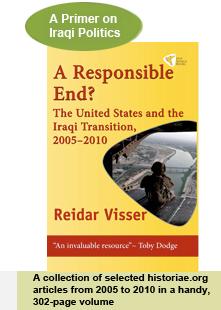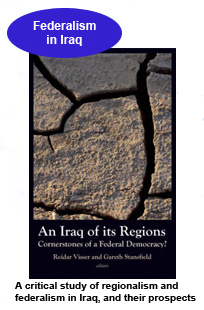



| Main | |
| Documents & images | |
| Links | |
| Contact | |
 | |
| amazon.com |

|
|
|
amazon.com
amazon.co.uk |
|

|
|
|
amazon.com
amazon.co.uk |
|
No Friends but the Kurds? The Biden Problem in Democratic Iraq Policy
By Reidar Visser (www.historiae.org)
16 September 2008
According to the Democratic Party platform presented in August, it is the goal of the party “to renew American leadership in the world” through rebuilding “the alliances, partnerships, and institutions necessary to confront common threats and enhance common security.” Moreover, “needed reform of these alliances and institutions will not come by bullying other countries to ratify American demands. It will come when we convince other governments and peoples that they, too, have a stake in effective partnerships. It is only leadership if others join America in working toward our common security.” This seems to be a step towards increased multilateralism, as well as a greater focus on searching for foreign-policy solutions that resonate with popular sentiment in the areas they apply to, instead of imposing an American agenda.
In the case of Iraq, the logical operationalisation of this programme would be to 1.) Listen to credible representatives of the Iraqi people as far as possible in finding a way to terminate the US military presence there; and, 2.) Help the Iraqis reverse imbalances and biases in Iraqi politics and artificial institutions of government and political arrangements that were introduced with the help of formidable military power during the Bush era between 2003 and 2008. It should be stressed that the second point is just as important as the first one: even if security has improved in Iraq over the past year, in terms of political institutionalisation the country has been in steep and continuous decline since the formation of the governing council in 2003, with the current climate best described as asphyxiating and certainly not the “breathing space” promised by the “surge”. It is the American-sponsored system of ethno-sectarian shares (muhasasa) rather than the Iraqis themselves that must shoulder most of the responsibility for the current stalemate in parliamentary politics in Baghdad and the failure to pass crucial legislation on oil, provincial elections and revision of the Iraqi constitution. On most of these issues, cross-sectarian majority alliances that could have produced legislative results are in fact in the making, but they stand no chance of succeeding due to the Byzantine system of minority vetoes introduced through the 2005 constitution – vetoes that by the way are no longer being used to guard the assumed “ethno-sectarian interests” they ostensibly were designed to protect, but rather serve to perpetuate the hegemony of three or four big political parties representing only 90 or so Iraqi parliamentarians out of 275 – the Kurdistan Democratic Party (KDP), the Patriotic Union of Kurdistan (PUK), the Islamic Supreme Council of Iraq (ISCI) and Daawa. It is critically important that Democratic policy-makers understand the nature and extent of these problems: without a minimum of arrangements designed to put Iraq back on its track it is simply impossible to withdraw US forces and assume that the status quo ante of April 2003 – a liberated Iraq free to make its own choices – has been restored.
It is for this reason that Democratic Iraq policy is at its best when it emphasises conditionality, or when it dares to be critical about the Maliki administration and the system it upholds. For example, last spring, during the Iraq hearings in the US Congress, Democrats suggested that the United States should use the occasion of the Status of Forces Agreement (SOFA) negotiations to put pressure on the Iraqis to achieve reconciliation goals. This is useful not because conditionality in itself is such a wonderful idea, but because the legacy of mistakes in terms of institution-building during the Bush era in Iraq is so extensive that it is probably only American power (or UN power with US support) that can reverse it. This sort of conditionality could be employed to make sure that free and fair provincial and parliamentary elections are held (to rectify the imbalances of the heavily-boycotted 2005 elections), and also that the Iraqi constitution is in fact revised – a key milestone in national reconciliation.
The big problem with Democrats when it comes to policy on Iraq is that they either focus exclusively on withdrawal (and thereby close their eyes entirely to the mistakes of the Bush administration in shaping Iraq’s political system between 2003 and 2008), or they engage with questions regarding choice of political system but do so in a manner that is even less in harmony with Iraqi traditions than Republican policy is. And this is where the vice-presidential candidature of Joe Biden is particularly important. After having been less specific about Iraq for a while (and especially around the Democratic convention in August), he has now resumed his agitation in favour of a decentralised Iraq, with several press interviews confirming the basic thrust of his “plan for Iraq” from 2006–2007.
It can be useful to briefly recall what the Biden plan is and what it is not. In its most innocuous iteration – the so-called “Sense of the US Congress on Federalism in Iraq – it advocates an “active federalisation” of Iraq. Contrary to press reports, it does not explicitly envisage tripartite partition or the complete obliteration of the central government. Nevertheless it does violate the Iraqi constitution in two big ways, firstly by proposing a conference to “settle” Iraq’s federalism question once and for all (the Iraqi constitution stipulates the opposite alternative: an evolutionary, bottom–up approach), and it also foreshadows a comprehensive federalisation of all parts of Iraq and features a general attack on centralism (the Iraqi constitutions enables those parts of the country that wish to retain a centralised state structure to do so in a hybrid, asymmetrical system). Additionally, much of the rhetoric by Biden and other senators on the subject clearly do favour a tripartite soft partition: Biden has “guessed” that there would be three regions, and much of the argument in favour of the scheme is based on the assumption of irreconcilable differences between “Shiites, Sunnis and Kurds”, and the supposed need for each of the three communities to have “space to breathe in”.
Over the past few weeks, all of these themes have been revived by Biden. The Delaware senator has repeatedly sought to convince journalists that the reason the “surge” is working is the absence of Shiites from Sunni-dominated Anbar: “there are no Sunnis in Anbar province--I mean, Shia in Anbar province…” This belief in sectarian identity as something that creates internal sub-group unity and enmity towards others is at its most glaring in Biden’s comments on the situation in Basra: “Do you think the people down in Basra are going to vote for a government in Basra any different than an all-Shia government in Basra?” asks Biden. In fact, the power struggle in Basra is currently between different Shiite groups that have radically different visions for what kind of status their area should have in Iraq. Some want a small federal region for Basra only, but most appear to prefer remaining under the central government. And those who back in 2005 and 2006 for a while advocated a third solution kindred to that proposed by Biden – a big Shiite region – have remained almost silent on the issue since late 2007.
Similarly, at the national level in Iraq, the trend is towards emphasising the role of the central government rather than focusing on federalism demands or the grand federal “settlement” called for by Biden only a week ago. Parliamentary majorities have stressed the role of the centralised state in administering the oil sector, retaining central government control of Kirkuk, and defining wide-ranging powers for the existing governorates but without crippling the central government. Iraqi politicians who favour Biden’s vision – KDP, PUK and ISCI – portrayed the February vote on the provincial powers law as a battle between centralisation and decentralisation (their preferred option) and they lost. Again, there is the issue of the provincial elections. According to Biden, “Exactly what I've proposed is happening. We’re about to have regional elections.” The real reason those elections are taking place at all is pressure from the political forces that reject decentralisation and want to challenge the ruling parties in an open contest: the government parties strenuously tried to avert the insertion of a timeline for elections back in February, but ultimately failed. In other words, Bush is wrong in his unlimited support for Maliki, but Biden is doubly wrong for supporting the minority of federalists that are increasingly losing their parliamentary battles.
All in all, on questions relating to state structure in Iraq, Biden has been mistaken on all counts: in terms of his interpretation of Iraqi politics (through continuing to deny the growing centralist trend and through continuing to focus on the exceptional 2006 situation); through his reading of the Iraqi constitution (by overlooking the asymmetrical and bottom-up character of Iraqi federalism); and through his failure to highlight the potentially grave regional consequences of his scheme (especially in terms of Iranian influence, which would probably be stronger in an ISCI-dominated federal entity than under any other arrangement). While the pro-Kurdish tendency inside the US Democratic Party is entirely understandable (and to some extent laudable) given all the suffering of the Kurds in the past, this should not be translated into an attempt to impose a Kurdish agenda on the rest of the country (as seemed evident for example in the recent US Democratic initiative to prevent oil deals with the central government). Most Iraqis are in fact perfectly prepared to accept the notion of complete Kurdish control in Kurdistan. It is the way Kurdish power is being used to push Iraq south of Kurdistan towards a decentralised system that many object to. On this issue, Biden is going against the prevailing wind in Iraq perhaps more than any other American politician. Today, those who are in tune with Iraqi politics emphasise limits on federalism that could help bring back a political system more in harmony with Iraq’s history, rather than the replication of the federalism formula everywhere south of Kurdistan. In other words, the Maliki government, but not the concept of centralised government as such, should be the object of criticism.
In defining his “gravitas” on foreign policy, the statesmanlike thing for Biden to do would be to admit mistakes when it comes to his interpretation of Iraqi politics, and instead focus on those aspects of his Middle East initiatives that are unequivocally constructive, such as his warnings against a war on Iran. Iraqi politicians already speak about Biden as the father of a second “Balfour declaration” because of his “plans”, and the Democratic Party would lose its credibility in the entire Arab world if these schemes were allowed to snowball. Rather than conniving in soft partition agitation in the name of party unity, Democrats should now make a firm and public stand against an imposed federalisation of Iraq. A more sustainable Iraq position would be to start focusing on cross-sectarian politics and the unitary state as the best way forward – with federalism as an option for areas where there is a real popular demand for it (like Kurdistan and perhaps Basra), but not as an imposition on the entire country through US “help” and sponsorship. That would also be in the true spirit of the “carefulness in getting out of Iraq” so rightly advocated by Barack Obama.
For blogs that feature interesting discussions about state structure in Iraq, see
Copyright © 2005-2008 historiae.org & Reidar Visser
This document or quotes from it may be freely reproduced as long as www.historiae.org is credited as the original source.
